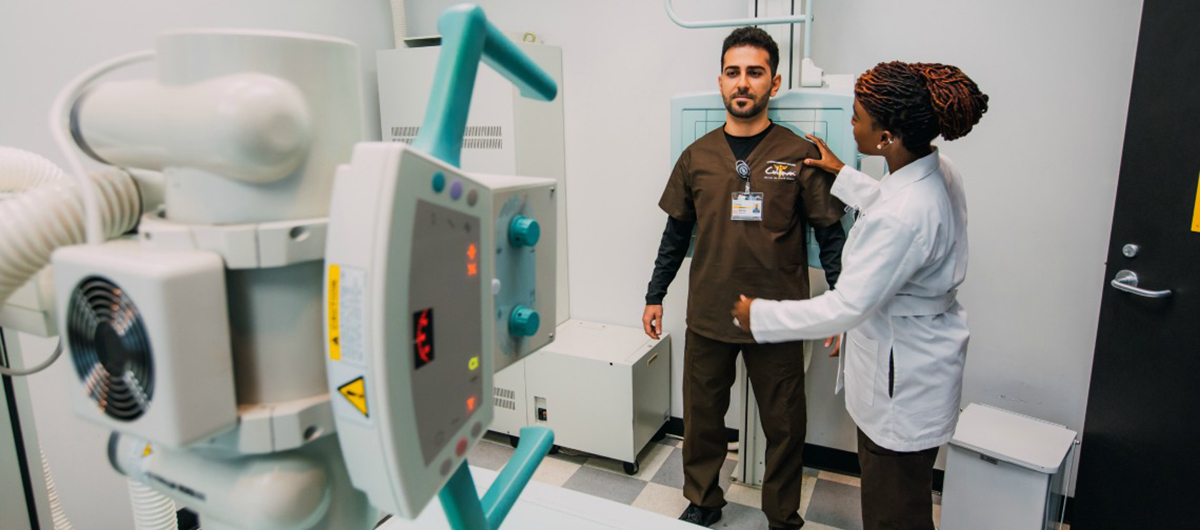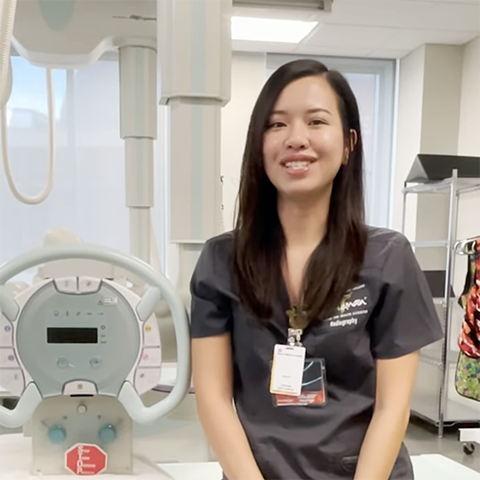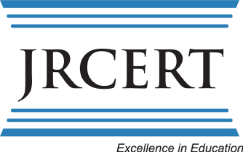Radiography

About the Program
A student in the two-year Radiography Program attends lectures and practices the skills being taught in lab settings at the Coleman Health Science Center College.
AWARD TYPES: Associate of Applied Science, Enhanced Skills Certificate
AREA OF STUDY: Health Sciences
Degrees and Certificates
Learn more about the Degrees and Certificates offered by this program by visiting the HCC Catalog.

Meet Linh Bui
Student Testimonial
HCC Coleman College continues to transform the lives of countless students every day. Meet Linh Bui, Radiography, Class of 2024, and get inspired to start your own rewarding career in healthcare!
Radiography Program Information
A Career in Radiography
The Bureau of Labor Statistics, as of 2007 says, “Radiographers produce x-ray images of the human body for use in diagnosing medical problems. They prepare patients for radiologic examinations by explaining the procedure, removing articles such as jewelry, through which x rays cannot pass, and positioning patients so that the parts of the body can be appropriately radiographed. To prevent unnecessary radiation exposure, technologists surround the exposed area with radiation protection devices, such as lead shields, or limit the size of the x-ray beam.
Radiographers position radiographic equipment at the correct angle and height over the appropriate area of a patient’s body. Using instruments similar to a measuring tape, technologists may measure the thickness of the section to be radiographed and set controls on the machine to produce radiographs of the appropriate density, detail, and contrast. They place the x-ray cassettes under the part of the patient’s body to be examined and make the exposure. They develop or process the images.
For fluoroscopic exams, radiographers prepare a solution of contrast medium for the patient to drink, allowing the radiologist, a physician who interprets images, to see soft tissues in the body. Radiologic technologists must follow physicians ’orders precisely and conform to regulations concerning use of radiation to protect themselves, their patients, and coworkers from unnecessary exposure. In addition to preparing patients and operating equipment, radiologic technologists keep patient records and adjust and maintain equipment. They may also prepare work schedules, evaluate equipment purchases, or manage a radiology department.”
Working Conditions
Most full-time radiologic technologists work about 40 hours a week; they may have evening, weekend, or on-call hours.Physical stamina is important, because technologists are on their feet for long periods and may lift or turn disabled patients. They work at diagnostic machines but may also do some procedures at patients’ bedsides. Some radiologic technologists travel to patients in large vans equipped with sophisticated diagnostic equipment. Although potential radiation hazards exist in this occupation, they are minimized by the use of lead aprons, gloves, and other shielding devices, as well as by instruments monitoring radiation exposure. Technologists wear badges measuring radiation levels in the radiation area, and detailed records are kept on their cumulative lifetime dose.
Employment
Radiologic technologists held about 196,000 jobs in 2006. More than half of all jobs were in hospitals. Most of the rest are in physicians’ offices and clinics, including diagnostic imaging centers; and outpatient care centers.
Salary
Median annual earnings of radiologic technologists were $48,170 in 2006. The middle 50 percent earned between $39,840 and $57,940. The lowest 10 percent earned less than $32,750, and the highest 10 percent earned more than $68,920. Median annual earnings in the industries employing the largest numbers of radiologic technologists in 2006 were:
- Medical and diagnostic laboratories $51,280
- Hospitals 48,830
- Offices and clinics of medical doctors 45,500
Certification
Graduates of the HCCS Radiography Program may apply to take the ARRT certification exam. To practice in Texas, radiographers must also hold a certificate from the Texas Medical Board. Any individual with a previous felony conviction should contact the ARRT for a Pre-Certification Application at (651) 687-0048 Ethics Division concerning eligibility requirements.
Accreditation
Accreditation Status: Accredited
Current Award Letter
The HCC Coleman College Radiography Program is accredited by the Joint Review Committee on Education in Radiologic Technology (JRCERT). The program had a site visit in 2021. Following the site visit, the JRCERT awarded HCC an 8 year accreditation award - the maximum award given.
An interim report will be required in the third quarter of 2025. If the accreditation award is maintained, the next site visit will be tentatively scheduled for the third quarter of 2029.
Concerns or questions regarding the program’s status of accreditation and compliance with these Standards should be directed to the program director.
Last Updated:7/5/24

JRCERT contact information is:
20 N. Wacker Drive, Suite 2850
Chicago, IL 60606-3182.
Phone: 312-704-5300
e-mail: mail@jrcert.org ; web: jrcert.org
Houston Community College (HCC) is accredited by The Southern Association of Colleges and Schools (SACS), the regional accrediting body. sacscoc.org.
Program Effectiveness Data
The following is the most current program effectiveness data. Our programmatic accreditation agency, the Joint Review Committee on Education in Radiologic Technology (JRCERT), defines and publishes this information. The information can be found directly on the JRCERT webpage.
Credentialing Examination: The number of students who pass, on the first attempt, the American Registry of Radiologic Technologists (ARRT) certification examination, or an unrestricted state licensing examination, compared with the number of graduates who take the examination within six months of graduation. The five-year average benchmark established by the JRCERT is 75%.
| Credential Examination Rate Year | Results: number passed on 1st attempt divided by number attempted within 6 months of graduation |
|---|---|
| Year 1 - 2020 | 26 out of 30 - 87% |
| Year 2 - 2021 | 32 out of 36 - 89% |
| Year 3 - 2022 | 28 out of 28 - 100% |
| Year 4 - 2023 | 34 out of 35 - 97% |
| Year 5 - 2024 | 36 out of 39 - 92.3% |
| Program 5-Year Average | 156 out of 168 - 92.85% |
Job Placement: The number of graduates employed in the radiologic sciences compared to the number of graduates actively seeking employment in the radiologic sciences within twelve months of graduating. The five-year average benchmark established by the JRCERT is 75%.
| Job Placement Rate Year | Results: number employed divided by number actively seeking employment within 12 months of graduation |
|---|---|
| Year 1 - 2020 | 27 out of 29 - 93% |
| Year 2 - 2021 | 30 out of 31 - 97% |
| Year 3 - 2022 | 27 out of 27 - 100% |
| Year 4 - 2023 | 35 out of 35 - 100% |
| Year 5 - 2024 | 35 out of 36 - 97% |
| Program 5-Year Average | 155 out of 159 - 97.5% |
Program Completion: The number of students who complete the program within the stated program length. The annual benchmark established by the program is 75%.
| Program Completion Rate Year | Results: number graduated divided by number started the program |
|---|---|
| Year 1 - 2024 | 38 out of 45 - 84.44% |
| Annual Completion Rate |
Program Goals and Student Outcomes
Maintain Outstanding Clinical Performance and Competency
Student Learning Outcomes
- Students will be able to accurately position the patient
- Students will apply appropriate radiation safety measures
- Students will produce an image of diagnostic quality
Practice Effective Communication Skills
Student Learning Outcomes
- Students will effectively communicate with healthcare professionals
- Students will demonstrate effective communication skills with patients
- Students will demonstrate effective oral communication skills
Develop Problem Solving Capabilities and Critical Thinking Skills
Student Learning Outcomes
- Students will demonstrate improvement in critical thinking skills upon graduation
- Students will demonstrate decision-making and problem solving abilities to decide if patient vitals are normal vs. abnormal, and the correct course of action in various other clinical scenarios
Licensure/Certification Exam Results
Third-Party Licensure/Certification Exam Results
Occupational licensure and/or certification pass rates reported by calendar year (Jan. 1 – Dec. 31). Results for the 2019, 2020, 2021, 2022, 2023,2924 calendar years are provided for comparison.
| Program/Aligned Award |
Agency |
HCC |
2019 Pass Rate |
2020 Pass Rate |
2021 Pass Rate |
2022 Pass Rate |
2023 Pass Rate |
2024 Pass Rate (# Taken # Passed) |
2024 |
2019–2024 Pass Rate Average |
|---|---|---|---|---|---|---|---|---|---|---|
|
Radiography |
75% |
75% |
97% (28/27) |
87% (30/26) |
89%(36/32) |
100%(28/28) |
97% (35/34) |
92.3% (39/36) |
Exceeds |
93.4% (196/183) |
Texas Education Association (TEA) Industry Based Certification Resource
| Certification Name | TEA Resource Link | Third-Party Certification Agency | Third-Party Certification Agency Website |
|---|---|---|---|
|
Radiologic Technology/ |
https://tea.texas.gov/sites/ |
American Registry of Radiologic Technologists | https://www.arrt.org/ |
Radiography Clinical Obligations
Each semester, students of the Houston Community College Radiography Program will be assigned to clinical sites in and around the Greater Houston Area. Students will be assigned to multiple clinical sites over the course of their six semesters within the program. The clinical coordinator will assign sites based on availability and these assignments will allow for a well-rounded clinical education. Students may be required to travel up to 50 miles away from campus to their assigned clinical sites. Students must provide their own transportation to these sites.
Full Time Radiography students will be assigned the following clinical rotations days as outlined below:
- Semester 1 (Fall) – Either Thursday or Friday 7:30 AM to 4:00 PM
- Semester 2 (Spring) – Tuesday and Thursday 7:30 AM to 4:00 PM
- Semester 3 (Summer) – Tuesday and Thursday 7:30 AM to 4:00 PM
- Semester 4 (Fall) – Monday, Wednesday, Friday 7:30 AM to 4:00 PM
- Semester 5 (Spring) - Monday, Wednesday, Friday 7:30 AM to 4:00 PM
- Semester 6 (Summer) – Monday and Wednesday 7:30 AM to 4:00 PM, Friday 7:30 AM to 11:30 AM
The above outlines the typical clinical schedule of most students. Some students may be assigned afternoon (12:00 PM – 8:30 PM) or evening (2:30 PM – 11:00 PM) rotations which will vary differently to the scheduled days and times listed above.
Part-time radiography program are required to complete 12-20 hours of clinical education per week at affiliated healthcare facilities.
Part-Time Clinical Scheduling
To accommodate the part-time program structure, clinical hours are scheduled during the following time periods:
Weekdays: Clinical rotations may be scheduled after 5:00 PM on Monday through Friday
Weekends: Clinical rotations may be scheduled anytime between 7:00 AM and 11:00 PM on Saturday and Sunday
Special Clinical Requirements: During the second year of the program, students may be required to complete daytime weekday clinical rotations to obtain essential fluoroscopy experience, as these procedures are typically performed during regular business hours
Students will not attend clinicals during observed school closures. If a weather emergency presents itself, the program director and clinical coordinator will follow established protocols to alert students of any clinical disruptions.
Clinical sites may require students to complete extra requirements to enter their facility. These requirements vary per site; faculty of the radiography program will notify students before the start of a clinical semester to ensure the student is informed of any additional obligations.
Below is a list of current clinical sites used by the program. This list can change upon the acquisition of new affiliations.
- HCA Houston Northwest Medical Center
710 Cypress Creek Pkwy
Houston, TX 77090 - HCA Houston Healthcare North Cypress
21214 Northwest Freeway
Cypress, TX 77429 - HCA Houston Healthcare West
12141 Richmond Avenue
Houston, TX 77082 - HCA Houston Healthcare Medical Center
1313 Hermann Dr.
Houston, TX 77429 - Houston Methodist Orthopedics – Pin Oak
5505 W. Loop South Freeway
Houston, TX 77835 - Houston Methodist Orthopedics – Spring Valley
9090 Katy Freeway, Suite 200
Houston, TX 77024 - Houston Methodist Orthopedics – TMC
6550 Fannin St. Suite 2600
Houston, TX 77030 - Houston Methodist Orthopedics – West
18400 Katy Freeway, Suite 200
Houston, TX 77094 - Kelsey-Seybold (Cypress) Clinic
13105 Wortham Center Dr.
Houston, TX 77065 - Kelsey-Seybold (Fort Bend) Clinic
11555 University Blvd
Sugarland, TX 77478 - Kelsey-Seybold (Memorial Villages) Clinic
1001 Campbell Rd
Houston, TX 77055 - Kelsey-Seybold (North Houston) Clinic
15655 Cypress Woods Medical Dr., Suite 100
Houston, TX 77014 - Kelsey-Seybold (Kingwood) Clinic
25553 US-59
Porter, TX 77365 - Kelsey-Seybold (Main) Clinic
2727 W. Holcombe Blvd
Houston, TX 77025 - Memorial Hermann Greater Heights Hospital
1635 North Loop West
Houston, TX 77008 - Memorial Hermann Hospital – Southwest
7600 Beechnut St.
Houston, TX 77074 - Memorial Hermann Orthopedic & Spine Hospital
5410 W Loop S
Bellaire, TX 77401 - Memorial Hermann – Texas Medical Center
6411 Fannin
Houston, TX 77030 - Michael E Debakey VA Medical Center
2002 Holcombe Blvd.
Houston, TX 77030 - River Oaks Hospital and Clinics
4200 Twelve Oaks Pl
Houston, TX 77027 - Joseph Medical Center
1401 St. Joseph Parkway
Houston, TX 77002 - Lukes Episcopal Hospital
6720 Bertner Ave
Houston, TX 77030 - Texas Children’s Hospital
6621 Fannin Street
MC-2-2521
Houston, TX 77030 - Texas Children’s Hospital – West Campus
18200 Katy Freeway
Houston, TX 77030 - Texas Orthopedic Hospital
7401 Main Street
Houston, TX 77030 - Memorial Hermann Greater Heights Convenient Care Center
1431 Studemont St
Houston, TX 77007 - Memorial Hermann – Katy
23900 Katy Fwy
Houston, TX 77494 - Fondren Orthopedic - TMC
7401 Main Street
Houston, TX 77030
Computed Tomography Program Information
A career in Computed Tomography
The Computed Tomography program is a one-semester evening program leading to an Enhanced Skills Certificate (ESC) or, in some cases, Continuing Education Units (CEUs). Courses have both theory and a competency-based clinical component. All CT courses must be enrolled in concurrently. Those who are accepted into the program will be required to pay a liability insurance fee, which protects the student against losses resulting from malpractice claims. Accepted students must also pay a radiation monitoring badge fee. The badge is required in all clinical education courses.
Marketable Skills
Learn more about the marketable skills—skills valued by employers that can be applied in variety of work settings—so you can communicate these to potential employers. Click on the relevant award title below to see descriptions of marketable skills for that area.
Ready to apply? OK let's start!
Applications for this program are accepted during the application window listed in the Admission Guide. Application evaluations will begin once the application window closes.
All admission communications will be sent via email, so please check your personal and HCC email accounts regularly.
1. Complete an information session
Learn more about the Radiography Program by completing an online information session.
The online information session is a mandatory requirement of the admission process.
2. Review the admissions guide
Please review the admissions guide for the desired program:
3. Are you a current/former HCC student?
If you are currently/formerly a registered HCC student with a valid student ID number and preferred email address, please proceed to step 4.
If you do not have an HCC student ID number, first apply to HCC at ApplyTexas.org .
4. Apply to the program.
Radiography Program
View and fill out the important documents below:
Computed Tomography Program
Click on the button below to apply for the Computed Tomography program.
Resources
Search for a Radiography Professor or request more information
Get in touch
Christopher Daza
Radiography/CTMT
